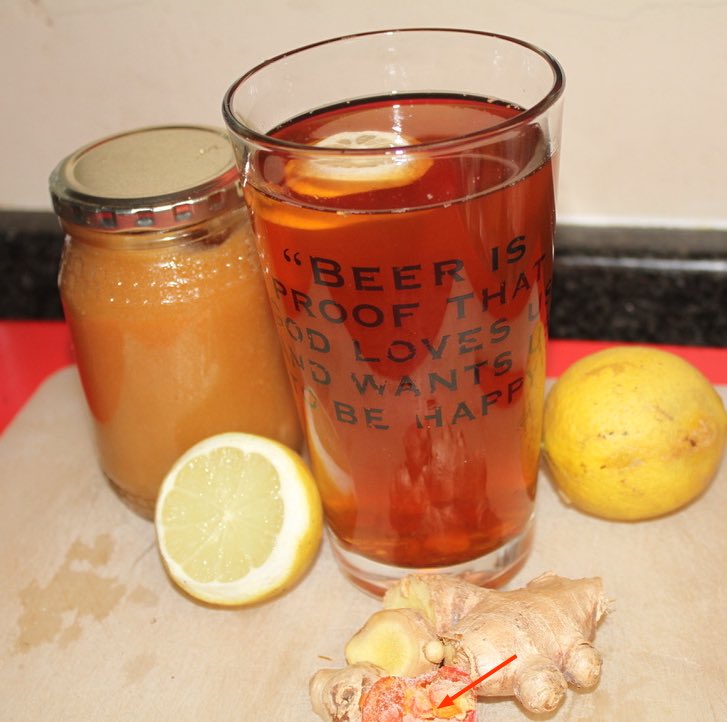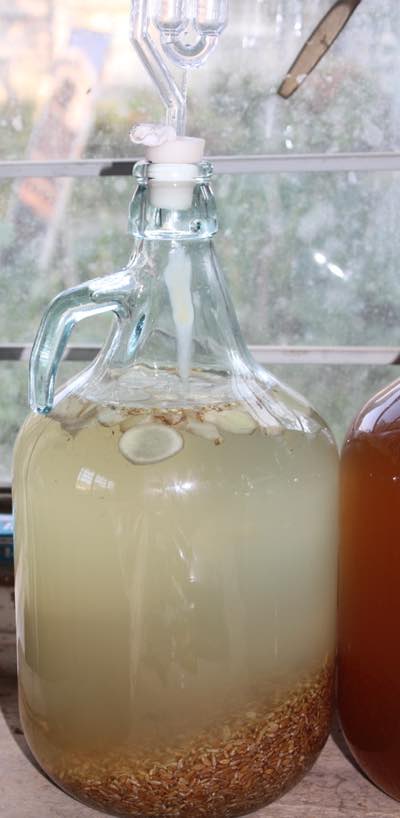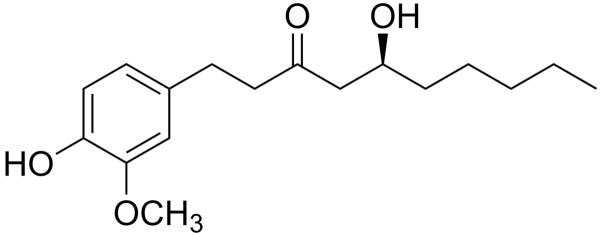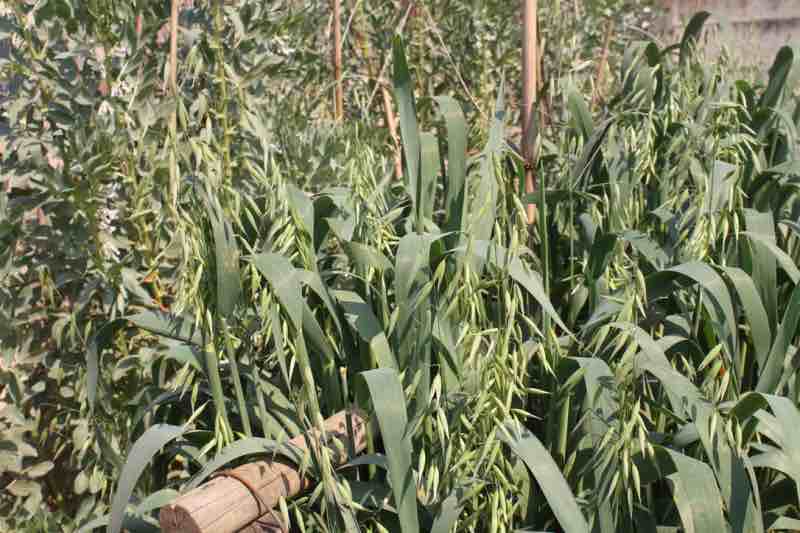- Bernard Preston homepage
- Herbs Spices
- Spicy Ginger Tea Recipe
Spicy ginger tea recipe
This spicy ginger tea recipe is perfect ice-cold before lunch on a hot summer's day; it is equally good in the evening as a warm tonic to help you sleep.
Use your favourite black, green or Rooibos-tea; milky oats makes an excellent variation. The ginger reportedly comes with a host of benefits but I drink it mainly just because I love the taste.
Not readily seen so I arrowed it in red, are a few seeds from a peppadew; it's a mild chili, for extra spice.

I confess I started hunting for a recipe for a spicy ginger-tea when I came to myself; and admitted that a quart of beer every evening was not doing me any good.
But my constitution demands a lot of liquid so what are the alternatives? Another is a milky oats tea.
How to make ginger tea
- Half a mug of hot left-over green or black tea.
- Cut a slice of ginger, perhaps about 1 teaspoon in all, peel and chop it finely; add it to the tea.
- Perhaps add a few chili-seeds if you like it extra spicy.
- Microwave it for about one-minute and allow the ginger to steep in the tea for a quarter of an hour. Heat the liquid on the stove if you are against nuking your food and drink.
- When still warm but no longer hot, stir in half a teaspoon of raw-honey.
- Add this concentrate to a large glass of iced-water.
- Add a slice or two of lemon; or lime.
Nausea of pregnancy
Ginger has been used for thousands of years for a variety of ailments which I will not comment on here; except that it is widely recommended for the nausea of pregnancy.
Many scientific-studies have been done and it has been concluded that unlike some other herbs and spices, it is perfectly safe to drink when pregnant.
As usual supplement-companies would rather you took it in capsules at many times the cost to you; and profit to them.
Disconcertingly researchers found there was absolutely no gingerol, the active-ingredient in some of the capsules[1]. You would never know.
Mostly we drink too little fluid; this spicy ginger tea recipe is an easy way to add a litre of water unspoiled with sugar, colouring and preservatives to your regimen.
Just as important to me is that the real flavour of fresh-ginger, sweetened with a little raw honey, tastes far better than anything the cola companies can come up with.
I do find it odd that we are ready to pay far more, when it tastes not half as good just because it takes a few-minutes to slice the ginger and allow it to steep.
Is it the attraction of a can or have we just been hoodwinked? Or are we simply plain lazy with far too much money jingling in our pockets?
Notes
Earlier I used unpeeled-ginger but I understand that much of it is sprayed with a herbicide to stop it from sprouting; so now I scrape it off and am hunting for an organic source.
I recommend only a small amount of honey, especially if you are insulin-resistant or diabetic; otherwise it may then give an unnecessary spike in blood glucose.
There is interesting research that natural honey does not raise our blood glucose as does that from the commercial bottlers[5]; nevertheless keep it in moderation.
Everyone should know their status in regard to diabetes, since more than half of the victims are walking the streets completely unaware that the sword of Damocles is hanging over their heads. The best test is the HbA1c.
Lower down we comment on the proven liver-protection given by ginger.
Two common causes of cirrhosis are firstly booze and secondly the non-alcoholic fatty liver disease provoked oddly not by food rich in butter and cream; but induced by the continuously raised blood glucose from frequent over-consumption of refined and simple carbohydrates. Snacking on cookies, candy bars and colas is deadly.
Honey too even in its raw form, should only be taken in small amounts. Even though I am a beekeeper, I limit myself to a maximum of three or four teaspoons a day.
In comparison, a litre of many soft and energy drinks contains over 30-teaspoons of sugar.
Artificial-sweeteners are even more damaging incidentally than sugar and cause insulin resistance[3]; they also demonise the microbiota in your colon.
“The most shocking result is that the use of artificial sweeteners aimed at preventing diabetes might actually be contributing to and possibly driving the epidemic that it aims to ameliorate.”
- Eran Elinav at the Weizmann Institute of Science
Both freshly-squeezed lemons and limes are rich in an important antioxidant.
It is called limonin.
Chili seeds are the best source of another phytochemical called capsaicin that acts as an anti-inflammatory.
These are not just the claims of a mad-hatter; type for example "capsaicin research" into Google and you will be astonished at the number of scientific papers in the literature.
Capsaicin benefits would be a good start to your search.
Only use spring or rainwater; the chlorine would spoil the taste of your tea.
Bone strength
Researchers writing in the American Journal of Clinical Nutrition report that older women who drink tea have significantly stronger bones, especially in their spines[6]. There is conflicting evidence as to whether adding milk contributes to this benefit or not.
Seasickness
Researchers report that a ginger extract may help with seasickness.
Confusingly they conclude that "Remarkably fewer symptoms of nausea and vertigo were reported after ginger root ingestion; but the difference was not statistically significant[7]."
General recommendations about seasickness are as follows.
- Go onboard as soon as possible before heading out to sea; not at the last minute.
- Stay near the ship's centreline as close to the waterline as possible.
- Focusing on the horizon helps.
- Lying face down with the eyes closed may help.
- Start your spicy ginger tea recipe at least 6 hours before going onboard.
Wheat beer

Wheat beer made with small amounts of added honey, ginger and raisins is another alternative to the commercial ale if you also feel you are drinking too much; it is very simple to brew and can be enjoyed after three or four days.
Although this is a 1 gallon recipe I found that it makes too much unless there are several tipplers in the family. I now make only three litres at a time. The alcohol content is low.
In the adjacent demijohn you can see a rich all-hive mead; now that is strong and needs to mature for at least four months.
Ginger is one of the ingredients of many meads.
Spicy ginger tea recipe
Spicy ginger tea recipe can be enjoyed as an ice-cold refreshing drink, or as a warm tonic to improve your circulation.
Sip your tea slowly and, as you enjoy the rich flavours, you will find yourself relaxing as you retreat from the business of the day.
Ginger has a spicy, sweetish flavour even before the addition of any honey. Our grandchildren have taken some time to get used to it, associating it with the bite of a chili; it is indeed moderately peppery. The scent is quite divine.
There are many bioactive ingredients in raw-ginger, the most important of which is thought to be a phenol called gingerol.
Elsewhere we will go into the various researched benefits of our spicy ginger tea recipe, but I will here comment on just one of them, since I raised the subject of enjoying it instead of beer.

Researchers have found that ginger does indeed reduce the oxidative stress associated with ethanol-induced liver toxicity[2]; cirrhosis.
Ginger also helps prevent the spread of cancerous tissue; it's complex stuff about inhibiting NETs that trap malignant cells and then spread them far and wide.
Those with non-alcoholic fatty liver disease would also benefit from this spicy ginger tea recipe, but without the honey. They have to go on very low carbohydrate meals, or die; it is the only known cure. Read more about the ketogenic diets.
Actually researchers in South Korea are using beeswax successfully to manage NAFL disease as it is known; alas avoid the honey, but chew and swallow the comb. Simple-sugars and refined carbohydrates are the devil.
Here is another interesting small tidbit. Researchers in Germany have found that commercial honey has a very high GI; but those from small beekeepers and presumably that in the comb have a low glycemic index below fifty-five[5].
"Do not eat any refined-carbs, period."
Dr Atkins
This is what is so effective about Atkins' famous weight-loss program. Did you know the average American consumes nearly a cup of sugar a day? That amounts to 152 pounds in a year[4]. Some eat far more because there are health nuts around like Bernard Preston who keep it below three teaspoons. Chocolate and ice cream undermine him very occasionally; that is okay.
These figures about sugar are from the the NH department of human and nutrition services by the way; others say it is only 65-pounds a year; that is still a lot.
Use the Site Search function in the navigation bar above to find the links to those topics, such as Banting for example.
Milky oats
A tea made from the pods of green oats have long been favoured in traditional medicine for calming the troubled spirit. But it really does taste very dull. I now slip in a few slithers of ginger and a slice of lemon.
Growing milky oats is very simple in the home garden.

- Variation in concentration and labeling of ginger-root supplements.
- Ethanol toxicity: rehabilitation of hepatic antioxidant defense system with ginger.
- Artificial sweeteners induce glucose-intolerance by altering the gut microbiota
- How much sugar do you eat? You may be surprised.
- Glycaemic and insulinaemic properties of some German honey varieties
- Tea drinking and bone mineral density in older women
- Ginger Root Against Seasickness
When browsing use right click and Open Link in New Tab, or you may get a bad gateway signal.
Newsletter
Our newsletter is entitled "create a cyan zone" at your home, preserving both yourself and Mother Earth for future generations; and the family too, of course. We promise not to spam you with daily emails promoting various products. You may get an occasional nudge to buy one of my books.
Here are the back issues.
- Lifestyle and ideal body weight
- What are ultra-processed foods?
- Investing in long-term health
- Diseases from plastic exposure
- Intensive lifestyle management for obesity has limited value
- A world largely devoid of Parkinson's Disease
- The impact of friendly bacteria in the tum on the prevention of cancer
- There's a hole in the bucket
- Everyone is talking about weight loss drugs
- Pull the sweet tooth
- If you suffer from heartburn plant a susu
- Refined maize meal and stunting
- Should agriculture and industry get priority for water and electricity?
- Nature is calling
- Mill your own flour
- Bake your own sourdough bread
- Microplastics from our water
- Alternative types of water storage
- Wear your clothes out
- Comfort foods
- Create a bee-friendly environment
- Go to bed slightly hungry
- Keep bees
- Blue zone folk are religious
- Reduce plastic waste
- Family is important
- What can go in compost?
- Grow broad beans for longevity
- Harvest and store sunshine
- Blue zone exercise
- Harvest and store your rainwater
- Create a cyan zone at your home
Did you find this page interesting? How about forwarding it to a friendly book or food junkie? Better still, a social media tick would help.
- Bernard Preston homepage
- Herbs Spices
- Spicy Ginger Tea Recipe
Address:
56 Groenekloof Rd,
Hilton, KZN
South Africa
Website:
https://www.bernard-preston.com